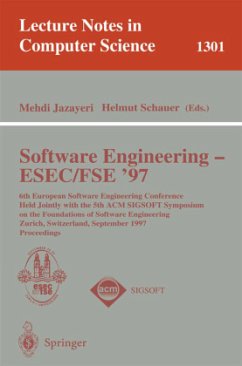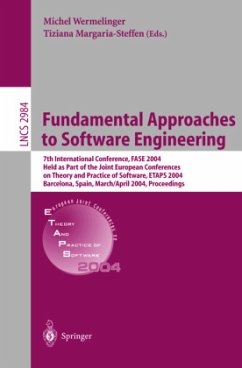
Software Engineering - ESEC '95
5th European Software Engineering Conference, Sitges, Spain, September 25 - 28, 1995. Proceedings
Herausgegeben: Schäfer, Wilhelm; Botella, Pere
Versandkostenfrei!
Versandfertig in 1-2 Wochen
39,99 €
inkl. MwSt.

PAYBACK Punkte
20 °P sammeln!
This book constitutes the proceedings of the 5th European Software Engineering Conference, ESEC '95, held in Sitges near Barcelona, Spain, in September 1995.The ESEC conferences are the premier European platform for the discussion of academic research and industrial use of software engineering technology. The 29 revised full papers were carefully selected from more than 150 submissions and address all current aspects of relevance. Among the topics covered are business process (re-)engineering, real-time, software metrics, concurrency, version and configuration management, formal methods, desig...
This book constitutes the proceedings of the 5th European Software Engineering Conference, ESEC '95, held in Sitges near Barcelona, Spain, in September 1995.
The ESEC conferences are the premier European platform for the discussion of academic research and industrial use of software engineering technology. The 29 revised full papers were carefully selected from more than 150 submissions and address all current aspects of relevance. Among the topics covered are business process (re-)engineering, real-time, software metrics, concurrency, version and configuration management, formal methods, design process, program analysis, software quality, and object-oriented software development.
The ESEC conferences are the premier European platform for the discussion of academic research and industrial use of software engineering technology. The 29 revised full papers were carefully selected from more than 150 submissions and address all current aspects of relevance. Among the topics covered are business process (re-)engineering, real-time, software metrics, concurrency, version and configuration management, formal methods, design process, program analysis, software quality, and object-oriented software development.














